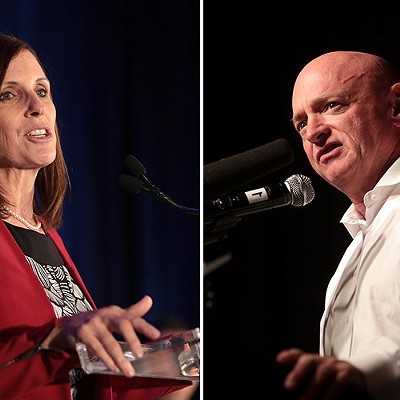On Oct. 7, the Tucson-based U.S. Institute for Environmental Conflict Resolution announced that it would help evaluate roughly 11,000 public comments about the copper mine, proposed for the Santa Rita Mountains south of Tucson. The comments are ultimately to be reflected in a draft environmental-impact statement, required by the National Environmental Policy Act and due next July.
For the task of convening mine proponents and opponents to sift through those opinions, the institute has been paid about $130,000. In turn, it's hired Oregon mediator Carie Fox to actually conduct the parleys.
According to Coronado Supervisor Jeanine Derby, the citizens' group will "provide the public an opportunity to examine the comments and follow parallel (the) process that we're internally working on, which is first of all to examine the information that came in, and make sure that the pertinent comments are extracted to be used as part of the analysis." That process will culminate in "tying the issues to those comments. The issues are what would drive the focus of the analysis."
Cutting to the chase: "It will help us understand whether we are interfacing with the same types of issues that the public feels are important," Derby says.
Another interpretation is that the Coronado hopes to cover its keister and deflect any potential criticism of the Rosemont analysis by pointing to this illustration of ample public outreach.
Here's how it is supposed to work: The citizens' group will sift through all of those comments with the help of Fox. Coronado officials will be doing the same in-house, with the idea of leaving no pro-or-con stones unturned. Still, there's plenty of skepticism about whether this elaborate, dual process will amount to diddly in the end.
Gayle Hartmann is president of Save the Scenic Santa Ritas, a group fighting the Rosemont mine. She's among those trying to figure out exactly what Fox hopes to accomplish. "It's obviously not mediation," Hartmann says, "because we don't think half a mine is a reasonable compromise."
In late October, several mine opponents met with Fox to discuss the new process. Hartmann gives the initial gathering a decidedly mixed review. "I don't know if we're actually going to go through with this or not yet, because there were a number of us there who had the same question, which was: What do we expect to get out of this? And why should we be spending a lot of our time, for free, doing something that may not provide a result that's valuable to us? The answer to that isn't terribly clear."
Fox pledged that she'd be returning in a few weeks "with a kind of step-by-step process," says Hartmann. "And then I think we'll have to decide whether this is worthwhile or not."
For her part, Fox says the still-evolving process would firm up once several key questions are answered. "How much time and energy do they have? What are good times to meet? Who are the players? What are the processes that work for them on a logistical basis?"
She also plans to swing her net wide: "It makes sense to have as many people represented at the table as possible."
The goal, says Fox, is to give the public a voice in this early stage of the environmental evaluation. "What normally happens is that when comments come in, the agency analyzes them in a relatively top-down manner. What we would like to do is a bottom-up approach ... with the collaboration of the work group."
She says the group would be looking for themes in the comments, and then organizing them "based on their understanding of what the comments are trying to say."
Then all of those compiled comments will be forwarded over to the Coronado--and what happens to them after that remains to be seen. For example, if the outside group raises points not emphasized by the Coronado's own analysis, could that alter the draft environmental-impact statement? Even Fox can't say for sure. "But one of the initial questions in my assessment is going to be, 'How can people have enough confidence in what the Forest Service will do with the information to make this worth their while?'
"That's always a question. And people are going to be giving up their Saturdays or whatever doing this not-unsubstantial job, and they're going to need to have a pretty solid feeling of what that means."
But if confidence-building is key, then Fox and the institute may be getting off to a rough start. Despite pledges for openness in this publicly funded process, Fox remains secretive about who she has been meeting with. At the initial stages of this process, she refused a request from the Tucson Weekly to list those meetings and their participants.
In fact, even Hartmann's group couldn't get an answer to that simple question at their first meeting with Fox. "We said, 'Look, we're all in this together, so let's not be secretive about it,'" Hartmann says. "At some point, I hope this becomes clearer, because it seems fairly silly to most of us."
Indeed, using taxpayer money to hash out public policy in private appears to be a recurring flaw with the institute's approach. Several years ago, I was ejected, as was a reporter from the Arizona Daily Sun, from an institute meeting being held in Flagstaff to discuss dwindling antelope herds in the Coconino National Forest (see "Two-Pronged Approach," Aug. 9, 2001). Hints of that earlier debacle can also be found in this current situation.
Coronado Supervisor Derby says she's given the institute carte blanche to shape its approach--even if that includes keeping the list of participants secret. "Maybe you're too early in asking those questions," she says. "You might look at it that way."
You might. Then again, given the stumbling nature of this Rosemont adventure so far, you might not.












